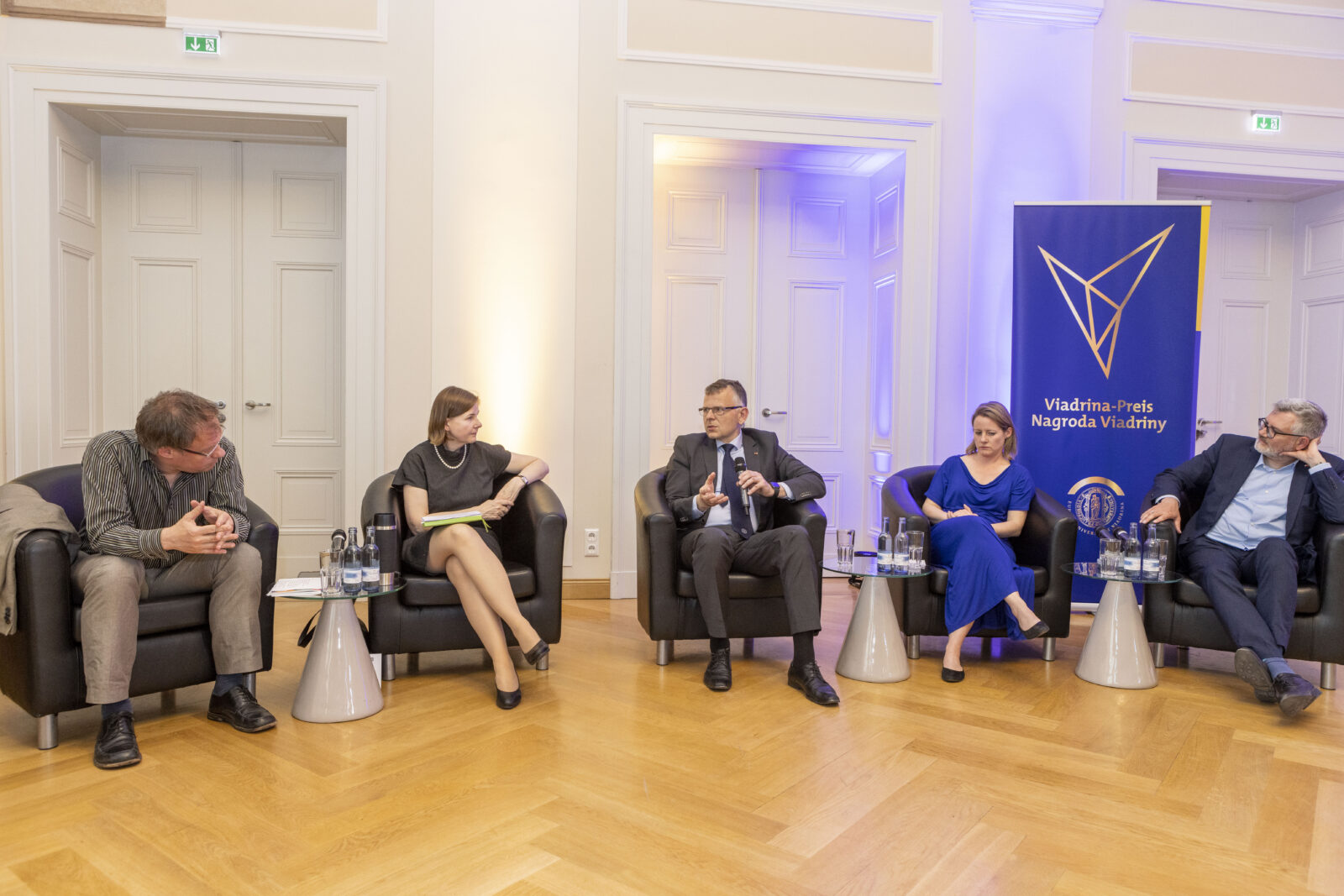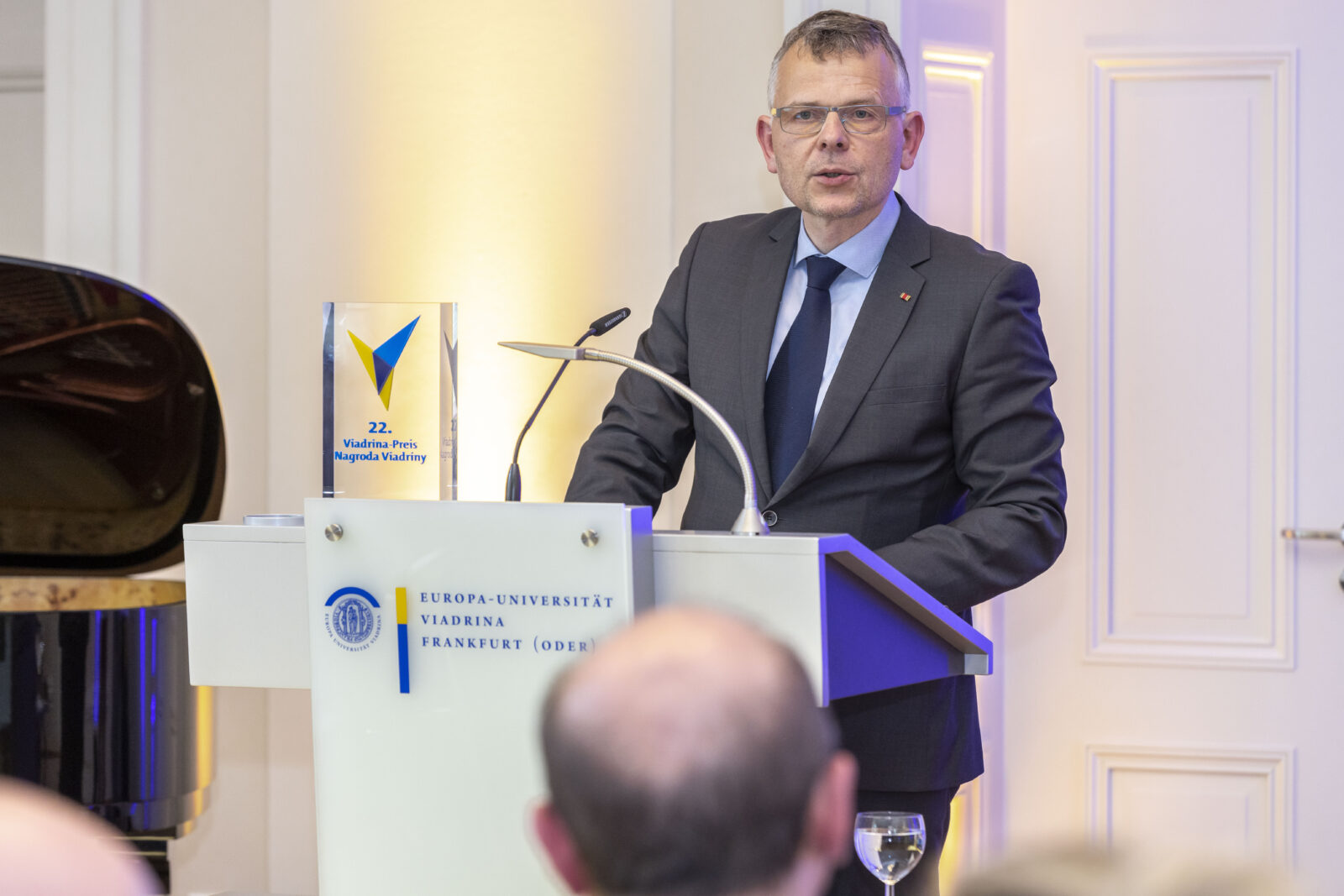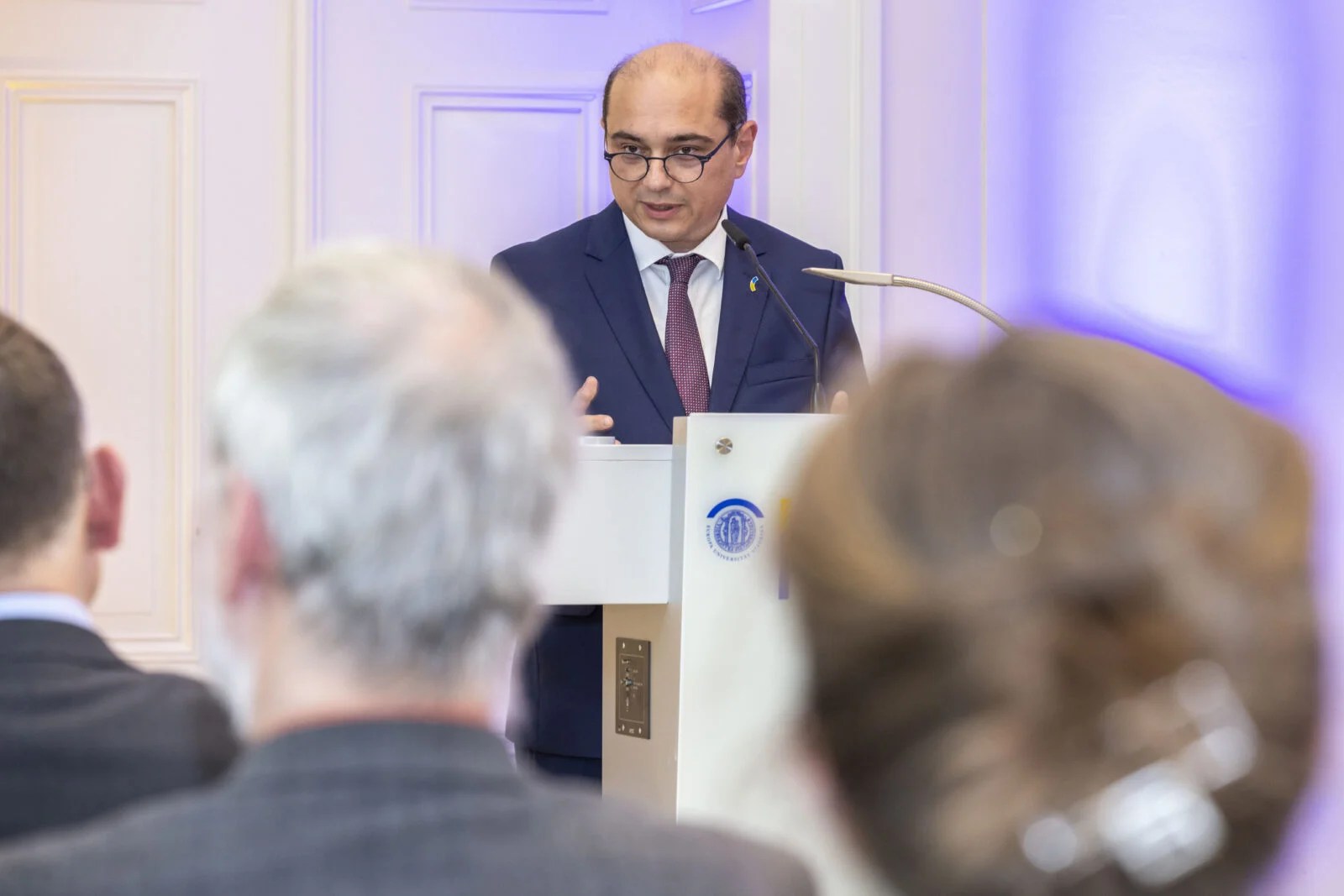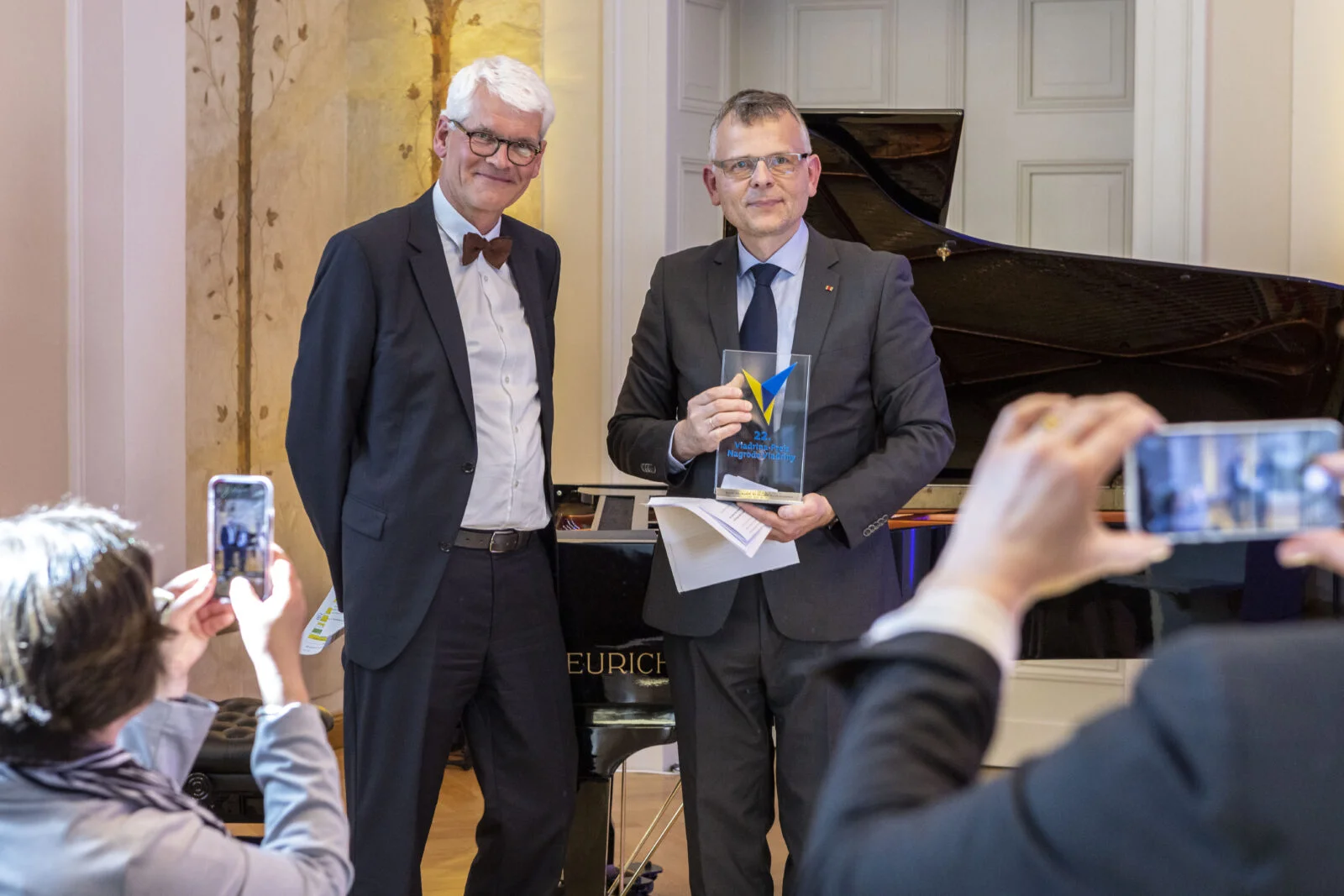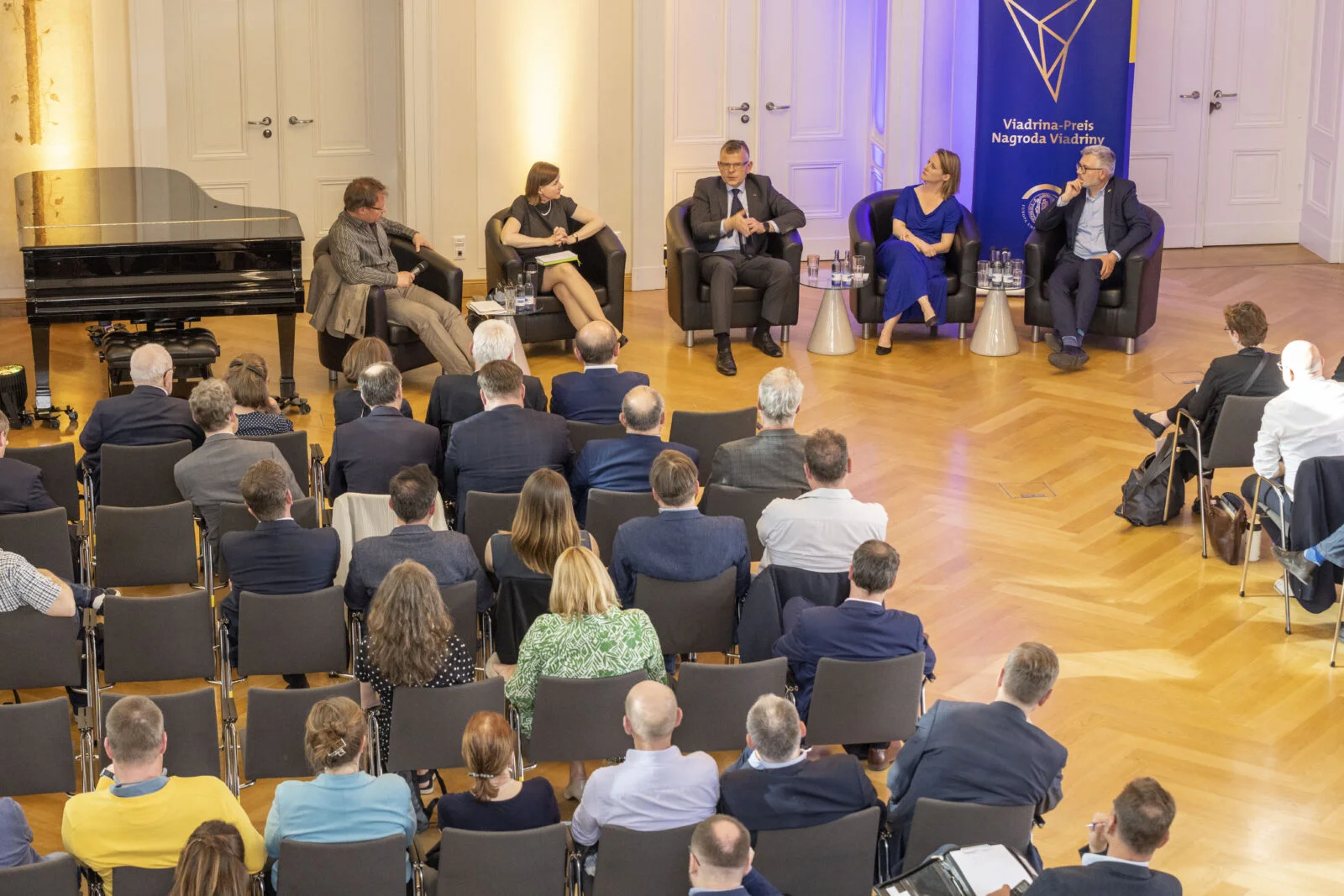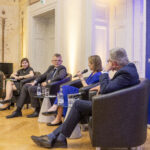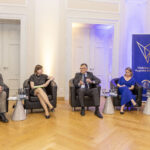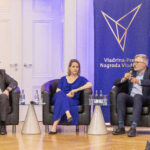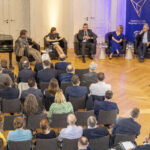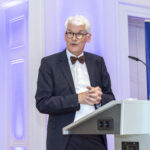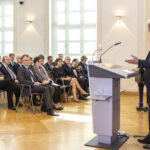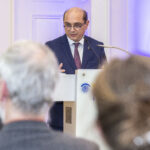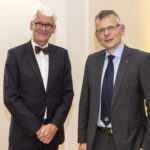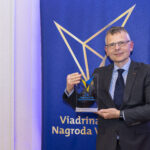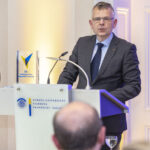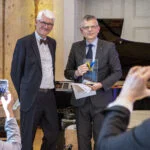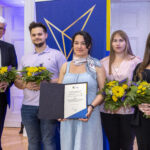
Prof. Ruchniewicz received the Viadrina Prize
With commitment and courage for democracy in Europe – Prof. dr hab. Krzysztof Ruchniewicz received the 22nd Viadrina Prize
The European University Viadrina in Frankfurt (Oder) has honoured the 22nd Viadrina Prize, an outstanding expert on Polish-Greman relations, prof. dr hab. Krzysztof Ruchniewicz as a courageous intellectual and committed educator. Historian, publicist and the director of the Willy Brandt Center for German and European Studies of the University of Wrocław received the Prize for outstanding contributions to Polish-German understanding and European idea.
In the laudation in honour of the laureate, Basil Kerski, the director of the European Solidarity Center in Gdańsk and the chief editor of the Polish-German magazine DIALOG, emphasized: “I came to know professor Krzysztof Ruchniewicz as a scholar who is characterized by civil courage. As a historian, he does not turn his back on the present. Due to his impressive productivity as a publicist, lecturer, blogger, and debates, conferences and publications initiator, he uses his academic expertise to take a public stand – against nationalist sentiment – on important issues of democratic development and Polish-German relations. Ruchniewicz represents “milions of Polish women and men, thousands of scholars and teachers who defend democracy in Europe.”
After accepting the Prize, prof. dr hab. Krzysztof Ruchniewicz said: “The Viadrina Prize is an appreciation of my years of efforts to promote dialogue between Poles and Germans. It is a confirmation of the right choice of my life path, which I made not only for my own benefit, but most importantly for the benefit of others”. For him, the Viadrina Prize also means a call to do everything possible to ensure that the barriers between Poland and Germany, which fell as a result of Poland’s accession to the European Union, do not reappear.
This year’s sponsorship prize is awarded to the project “Literary Translation in Polish-German Cultural Dialogue”. Since 2016, as part of the project, at the invitation of the Karl Dedecius Foundation of the European University Viadrina, German students of Polish studies and Polish students of German studies meet every two years on the Oder River.
After the award ceremony, prof. dr hab. Krzysztof Ruchniewicz took part in a discussion with Irene Hahn-Fuhr, a member of the leadership of the Zentrum Liberale Moderne, and Dietmar Nietan, the coordinator of Polish-German cooperation at the Ministry of Foreign Affairs of the Federal Republic of Germany, on Polish-German relations before the parliamentary elections in Poland.
Prof. dr hab. Krzysztof Ruchniewicz has been involved in Polish-German relations since his student years, which he spent in Wrocław, Saarbrücken and Marburg. He wrote his master’s thesis on the Joint Polish-German Textbook Commission. He later defended his doctoral thesis on political relations between Berlin, Bonn and Warsaw, and his habilitation thesis on the Polish effort for German reparations. In 2002 Krzysztof Ruchniewicz cofounded the Willy Brandt Center for German and European Studies at the University of Wrocław and has been its director almost continuously since then He is also the head of the Department of Contemporary History at the Center and a researcher at the Historical Institute of the University of Wrocław.
Krzysztof Ruchniewicz is a recipient of the Gold Cross of Merit of the Republic of Poland and the Cross of Merit with Ribbon of the Federal Republic of Germany.
Viadrina Prize
Since 1999, the European University Viadrina has been awarding the Viadrina Prize to outstanding personalities and significant initiatives from all areas of social life for their commitment to understanding, cooperation and reconciliation between Poland and Germany. The Viadrina Prize symbolises the agreement between the nations, peace, and freedom in their European home. These values are the foundation of the founded in 1991 European University Viadrina. The EUR 5,000 prize is awarded annually.
Laureates of the Prize include: Karl Dedecius, Günter Grass, Adam Michnik, Tadeusz Mazowiecki, Krzysztof Penderecki, Hans-Dietrich Genscher, Agnieszka Holland i Róża Thun.
(Text: The European University Viadrina)
We publish prof. Krzysztof Ruchniewicz’s acknowledgements on receiving the Viardina Prize below:
Dear Mr. President, Magnificence, Dear Prize Committee, Dear Colleagues, Dear Friends, My Family
On such a day, it is difficult to escape emotion, a sense of pride and gratitude. “After all, The Viadrina Prize is an appreciation of my years of efforts to promote dialogue between Poles and Germans. It is a confirmation of the right choice of my life path, which I made not only for my own benefit, but most importantly for the benefit of others. I would not be standing in front of you today if at the beginning of this path and on its subsequent stages I had not met exceptional, wonderful people who were my guides and many became my friends. I owe them all a grateful memory, because without them my life would have turned out differently. Unfortunately, many of them are no longer alive and it is a painful loss. However, some of them are here or are following our celebration on their computer screen.
Allow me to mention at least some of them. I would like to mention my now deceased parents, Wanda and Henryk, who, although became half-orphans as a result of the war, lost their family homes and carefree childhood, did not implant in me a sense of injustice, resentment against the Germans or a desire for retaliation. I’m very sorry they are not among us today. I want to mention my German teacher from a Wroclaw high school, Danuta Lipinska, who in the early 1980s. in the 20th century in the declining communist era, introduced me to the world of German history, culture and, of course, language. This was a good starting point for later addressing German or Polish-German topics.
I was able to study them at the master’s seminar of my master studies, a professor at the University of Wrocław, the rector of this university, Wojciech Wrzesiński, who soon became my supervisor and accompanied me at all stages of my academic career. I also benefited a great deal from a research exchange with a legal historian from our University, Prof. Karol Jonca. Both professors, Wrzesiński and Jonca, were part of the co-founders of Viadrina 30 years ago.
The historic breakthrough of 1989-1990 opened wide the doors to all sorts of meetings and exchanges, through which I met many exceptional Germans. A friendly hand was extended to the budding Polish historian seeking his own path in the maze of various big topics by Klaus Matussek, a teacher from West Berlin, Heinrich Mrowka, a librarian from Marburg, a native of East Prussia, and Georg Drost, an entrepreneur from Munich, a Wrocław native by birth. It was he who, during many trips to the Oder River, became my guide to the German Wrocław of his childhood, to my city, which I was getting to know all over again in this way. This is also how I began to discover my native Silesia, shown to me by my German friends who are connected to this region by birth, such as Professor Arno Herzig from Hamburg.
The fall of the Wall and the unification of Germany, two events that I experienced in person, the first in Berlin and the second in Bonn, will always remain in my memory. That’s when I felt the pulse of History beating, finally bringing us hope and good prospects. This undoubtedly influenced my further life and career choices. Studying with Prof. Joerg K. Hoensch in Saarbruecken, then Prof. Hans Lemberg in Marburg completed my education and allowed me to expand my network of contacts. Scholarships, study stays, lectures and participation in conferences, seminars and debates allowed me to learn about Germany from different perspectives. I would not have gathered these experiences without the friendly support of Dr. Detlef Preuss and Falk Altenberger of the Adenauer Foundation, Prof. Friedhelm Boll of the Ebert Foundation, and Dr. Christian Bode and Hans Golombek of DAAD. Sometimes this learning and deepening of relationships on a professional and personal level took place in Poland, in Silesia, such as in Krzyzowa in the early 1990s. of the 20th century where young Poles, Germans, but also Ukrainians and residents of other countries met. It was there that my friendship with Johanes Nolte began, who was then a law student from Heidelberg, and historian Dr. Annemarie Franke.
An important chapter for me became cooperation with the Polish-German Textbook Commission, then many years of membership in its presidium. It was then that my contacts with the remarkable historian prof. Włodzimierz Borodziej, whose recent early passing has left not only me, and not only Poland, with a sense of irreparable loss.
Invitations to participate in the realization of international projects quickly resulted in new acquaintances and friendships. It is impossible to mention all the colleagues I met on my path and to whom I owe a lot. Mentioning them would exceed the scope of this short speech. I was saved from more than one linguistic slip-up by Sabine Stekel and Markus Krzoska. It has been an honor and an inspiration for me to work on many international projects with my colleagues Jacek Barski, Dieter Bingen, Marko Demantowsky, Constantin Goschler, Hubert Orlowski, Martin Schulze-Wessel, Stefan Troebst, Marcin Wiatr, Mark Zybura and many others.
I thank from the bottom of my heart my colleagues at the Willy Brandt Center of the University of Wrocław. Thanks to their work and effort, and the kind support of rectorial authorities of my university, we have been able to achieve considerable success in two decades of action and become one of the leading German studies centers in Poland.
To my wife Małgorzata, thank you for your patience and great support, especially in moments of doubt and uncertainty. Her selfless help is a proof of the enormous love she has for me. Her family home in the Klodzko area is a quiet and friendly place for me. Our son, Jan, though he did not become a historian, chose the profession of his dreams, taking advantage of the opportunities given to young Europeans.
In the past few years I have taken a closer look at the fate of my Kaszubian part of the family. Finding a school chronicle in Reskowo started by my great-great-grandfather, a village teacher, at that time a Prussian subordinate, was very touching for me. I am glad that one of my cousins, the director of the Museum of Kaszuby, Barbara Kąkol, is present here today.
And finally, although it is only a result of the composition of this speech, I thank my friend Basil Kerski, a man of great contributions, for the laudation just delivered. It is an honor to hear so many good words from the mouth of an outstanding specialist and advocate of German and European affairs.
The Viadrina Prize is an honor for me, but also a commitment. I hope that the laurel handed over today will also become another impulse to further develop contacts between our universities, to make the already functioning relations even stronger and more effective.
I mentioned the historical events of 1989-1991. Lastly, I will mention one more thing that all of us gathered in this room, in this city, located directly on the border, appreciate, although perhaps sometimes, in the daily hustle and bustle, we forget its importance. I am referring to Poland’s accession to the European Union and the related removal of further barriers between Poland and Germany. I also see this prize as a call for me to do everything possible to ensure that these barriers do not spring up again.
I sincerely thank you!
Photos: Heide Fest/Viadrina
Translated by Aleksandra Chowaniec (student of English Studies at the University of Wrocław) as part of the translation practice.



